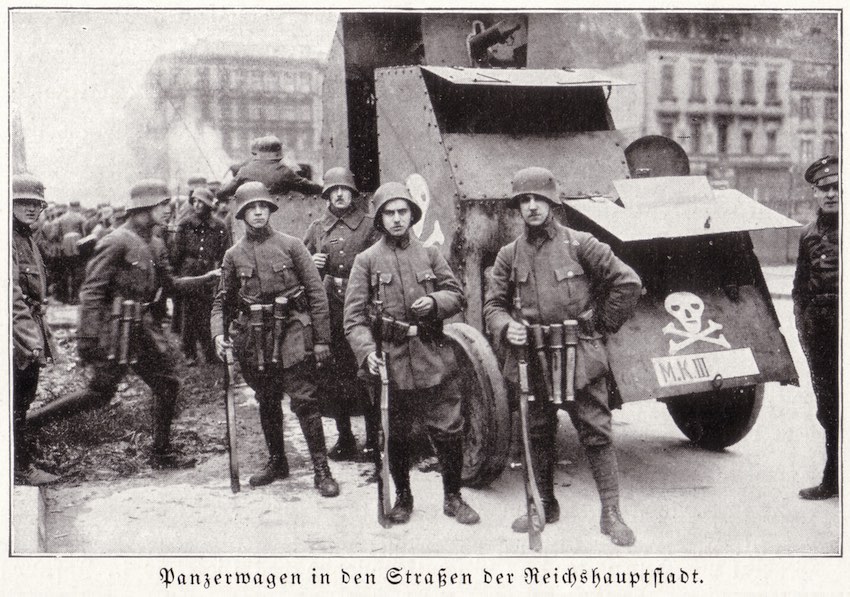Opinion: Willkommen Weimar, all over again
Shortly after the end of World War I, Germany found itself in an interesting crossroads. They had just managed to survive the world’s deadliest conflict (up to that point in history), and their substantial defeat created feelings of discontentment and suspicion for their own countrymen. The country was becoming socially liberalized yet still maintained a significant distrust for their own countryman due to the “stab-in-the-back” myth — the idea that certain social, religious and political groups pressured the government to give up further effort to win the war. The military also faced downsizing — as a result of the Treaty of Versailles — thus decreasing morale and creating an atmosphere of potential mutiny. Not to mention, veterans were angered at their humiliation on the world stage and faced few opportunities to start a new life away from the military.
Economic stagnation and failure also set in. At one point, 50 million Reichsmarks became the equivalent of one U.S. dollar, severely limiting economic mobility. What goods could be imported under the Versailles Treaty were too expensive for most Germans to afford in the post-war period, and there were severe losses in available labor and well-paying jobs.
Germany reached a boiling point in 1918, immediately after WWI ended. The German Revolution was a series of civil conflicts and uprisings that ultimately replaced the monarchy of Kaiser Wilhelm II with a German Republic. Shortly after, militant leftist groups — such as the Communist Party of Germany, Spartacus League and Bavarian Soviet Republic — took advantage of the newly formed young republic and set out to start a revolution to turn it into a socialist state. This was known as the Spartacus Uprising, which was quickly suppressed by the new Weimar government and the Freikorps — an anti-communist paramilitary organization comprised of veterans that sought to prevent potential communist uprisings by force. In the end, the revolutionaries failed and were either arrested, or tortured and executed, and the new republic continued to grow and thrive.
Despite an economic recovery during the ’20s, many Germans still felt alienated or despondent towards the inability of the government to protect its people as well as maintain order. Many still felt that the German Empire was betrayed by its own countrymen — specifically Socialists, Pacifists, “Intellectuals” and Jews. Left and right-wing paramilitaries and extremists continued to plague Germany, including what would become the Nazi Party. The Nazis ascension to power via intimidation, strikes and violence would continue until Adolf Hitler took power in 1933. Shortly afterword, the Reichstag Fire was used to enact the Enabling Powers, allowing the party — as well as Hitler — to make laws and decrees without the due process of the government. With these fatal blows to democracy, the curtains close on the story of Weimar Germany.
Why is this story so important? It’s not that we have death squads or paramilitary arms of our political parties harassing and killing political opponents, nor do we have a truly oppressive government — or figurehead — in power. However, the events described are still similar to the current social and political climate of modern America. Our economy seems stagnant despite the appearance of growth. We’ve plunged ourselves into futile conflicts halfway around the world while veterans at home cannot receive the care or attention they need to support themselves. Despite a democratic way of governance, we feel as if our government isn’t even in our control, but acts as some far-away entity that applies its governance at its own will. In turn, we have grown an unsettling desire to become more extreme in our actions to have our voices heard. We have begun to consider the view of extremists beyond tolerable to the point of genuine consideration.
With more and more people feeling disenfranchised with their leaders, representatives and economic opportunities, we have become more polarized and less willing to tolerate the existence of differing views. In turn, we have sought out organizations or groups that make us feel more empowered and promise better economic opportunities and political power — even at our own expense. Groups like Antifa, By Any Means Necessary, left and right-wing militia movements, the Traditional Workers Party and the “alt-right” are all manifestations of moving away and encouraging hostile silence or violent actions to oppose their ideological enemy. Get the picture?
We must not succumb to the Weimar disease — the desire to become complacent with the failures of the government and the people to maintain order and protect our civil liberties. We cannot allow ourselves to become ignorant of the growing, bridgeless political and cultural divide which threatens to allow others to resort to force or coercion. We must encourage anti-extremism — towards any kind — to take root in our communities. We must learn to understand how others think, feel and vote, and encourage others to allow peaceful discussion and debate to take the place of tension. We must focus on protecting the same liberties that have become a cornerstone of our nation. We cannot fall into chaos and revolutionary violence at the expense of ideological victory — such was the end of a democratic Germany 84 years ago.







